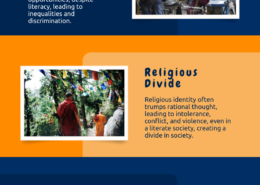Discuss the role of women in changing the courses of war and creating peace since 1914.
Edmund Burke's theory of the sublime holds significant influence within the broader context of Romantic aesthetics. Burke distinguished the sublime from the beautiful, associating it with vastness and the capacity to invoke intense emotions such as terror and wonder. This focus on emotion plays a crRead more
Edmund Burke’s theory of the sublime holds significant influence within the broader context of Romantic aesthetics. Burke distinguished the sublime from the beautiful, associating it with vastness and the capacity to invoke intense emotions such as terror and wonder. This focus on emotion plays a crucial role in Romantic art and literature, where the aim was to evoke powerful feelings.
Romantic artists and writers were deeply interested in the emotional power of nature. Burke’s concept of the sublime aligned with this interest by suggesting that the vastness and grandeur of nature could elicit profound emotional responses. The sense of awe and terror that nature’s immensity could inspire resonated with the Romantic pursuit of emotional intensity.
Burke’s idea that the sublime involves an overwhelming emotional experience—often bordering on terror—provided a framework for understanding the Romantic fascination with the wild and untamed aspects of nature. This is exemplified in the dread and awe inspired by vast landscapes, thunderstorms, and towering mountains. Such experiences leave individuals with a sense of the sublime, marked by a mix of terror and admiration.
In essence, Burke’s theory provided the Romantics with a way to justify their emotional and imaginative engagement with nature, making the sublime a key element in their artistic and literary expressions.
See less

Since 1914, women have played significant roles in both influencing the course of wars and fostering peace efforts globally. Their contributions span from direct involvement in wartime activities to advocacy and leadership in peace movements. World War I and II: During these wars, women took on critRead more
Since 1914, women have played significant roles in both influencing the course of wars and fostering peace efforts globally. Their contributions span from direct involvement in wartime activities to advocacy and leadership in peace movements.
World War I and II: During these wars, women took on critical roles traditionally held by men, who were away fighting. They worked in factories, served as nurses, and took up roles in civil defense. Their contributions were vital to the war effort, proving their capability and challenging traditional gender roles. Notable figures like Florence Nightingale in earlier conflicts laid the groundwork for this expanded participation.
Post-War Advocacy: After the wars, women were instrumental in peace-building and reconstruction. The formation of organizations such as the Women’s International League for Peace and Freedom (WILPF) in 1915 highlighted women’s commitment to advocating for peace and disarmament.
Cold War Era: Women continued to influence global politics during the Cold War. They were involved in anti-nuclear movements, such as the Greenham Common Women’s Peace Camp in the UK, which protested nuclear weapons and promoted peace.
Modern Conflicts and Peace Processes: In contemporary times, women have been crucial in peace negotiations and conflict resolution. United Nations Security Council Resolution 1325, adopted in 2000, recognized the importance of involving women in all aspects of peace and security. Women like Ellen Johnson Sirleaf and Leymah Gbowee in Liberia played key roles in ending the civil war and fostering reconciliation, for which they received the Nobel Peace Prize in 2011.
Grassroots Movements: Women often lead grassroots peace movements, advocating for community-based solutions to conflict. In places like Northern Ireland, women’s groups have been central to peace efforts, working across divided communities to build trust and cooperation.
Political Leadership: Women in political leadership roles have also influenced peace and conflict. Leaders such as Angela Merkel in Germany have been pivotal in diplomatic efforts and promoting stability within Europe and beyond.
Overall, women have significantly impacted the course of wars and the creation of peace through their resilience, leadership, and advocacy. Their contributions highlight the essential role of gender inclusivity in achieving lasting peace and security.
See less